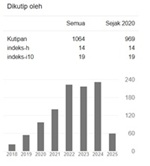HASIL BELAJAR DAN EFIKASI DIRI SISWA SEKOLAH MENENGAH PERTAMA PADA MATA PELAJARAN MATEMATIKA
Abstract
This research is a quantitative descriptive study that aims to determine the level of student self-efficacy in mathematics and the relationship of self-efficacy with student mathematics learning outcomes. The population of this research was 56 junior high school students in Serang, Banten. The sample of this research was 30 students with the sampling technique used was a simple random sampling technique simple. To determine the relationship between student’s self-efficacy and mathematics learning outcomes, a simple linear regression test and Pearson correlation test were performed. The results of this research were the level of student’s self-efficacy is in the medium category and student’s self-efficacy has an influence but not significant on student’s mathematics learning outcomes.
Keywords
Full Text:
PDFReferences
Adelia, Winda. (2011). Kehebatan Berpikir Positif. Yogyakarta: Sinar Keroja.
Arriah, F. (2017). Effect of Metacognition and Self Efficacy Against Mathematics Learning Achievement Through Student Creativity Class XI SMAN in City of Bulukumba BULUKUMBA. Jurnal Daya Matematis, 5(2), 105–116. https://doi.org/10.1017/CBO9781107415324.004
Bandura, A. (1997). Theoretical Perspectives: the nature of human agency. In Self-efficacy: The exercise of control (p. 3). https://doi.org/10.1007/SpringerReference_223312
Chairiyati, L. R. (2013). Hubungan Antara Self-Efficacy Akademik dan Konsep Diri Akademik dengan Prestasi Akademik. Humaniora, 4(2), 1125–1133. https://doi.org/10.21512/humaniora.v4i2.3553
Disai, W. I., Dariyo, A., & Basaria, D. (2017). Hubungan antara Kecemasan Matematika dan Self-Efficacy dengan Hasil Belajar Matematika Siswa SMA X Kota Palangka Raya. Jurnal Muara Ilmu Sosial, Humaniora, Dan Seni, 1(2), 556–568. https://doi.org/10.24912/jmishumsen.v1i2.799
Ghufron, M. N., & Suminta, R. R. (2018). Efikasi Diri dan Hasil Belajar Matematika : Meta-analisis. Jurnal Majamath, 1(2), 103–116.
Pujihastuti, I. (2010). Prinsip Penulisan Kuesioner Penelitian. Jurnal Agribisnis Dan Pengembangan Wilayah, 2(1), 43–56.
Putri, W. K. H. W., & Prabawanto, S. (2019). The analysis of students ’ self-efficacy in learning mathematics. Journal of Physics: Conference Series, 1–7. https://doi.org/10.1088/1742-6596/1157/3/032113
Putwain, D., Sander, P., & Larkin, D. (2013). Academic self-efficacy in study-related skills and behaviours: Relations with learning-related emotions and academic success. British Journal of Educational Psychology, 83(4), 633–650. https://doi.org/10.1111/j.2044-8279.2012.02084.x
Roberto, J. (2019). The Relationship between Affectivity and Self-efficacy for the Learning of Mathematical Contents. Acta Scientiae, Canoas, 21(5), 163–177. https://doi.org/10.17648/acta.scientiae.4122
Sadewi, A. I., Sugiharto, D., & Nusantoro, E. (2012). Meningkatkan Self Efficacy Pelajaran Matematika Melalui Layanan Penguasaan Konten Teknik Modeling Simbolik. Indonesian Journal of Guidance and Counseling: Theory And Application, 1(2), 7–12.
Sari, N. Y., Zulkarnain, I., & Kusumawati, E. (2018). Self Efficacy Siswa Dalam Menyelesaikan Soal Matematika Berbentuk Cerita. Vidya Karya, 33(1), 28–34. https://doi.org/10.20527/jvk.v33i1.5390
Subaidi, A. (2016). Self-Efficacy Siswa Dalam Pemecahan Masalah Matematika. Jurnal ∑igma. Universitas Madura, 1(2), 64–68. https://doi.org/10.0324/SIGMA.V1I2.68
Sunawan, S., Ahmad Yani, S. Y., Kencana, T. I., Anna, C. T., Mulawarman, & Sofyan, A. (2017). Dampak Efikasi Diri terhadap Beban Kognitif dalam Pembelajaran Matematika dengan Emosi Akademik sebagai Mediator. Jurnal Psikologi, 44(1), 28–38. https://doi.org/10.22146/jpsi.22742
Tayibu, N. Q. (2017). Pengaruh Intelegensi, Task Commitment dan Self Efficacy terhadap Hasil Belajar Matematika Siswa SMA. Journal of EST, 2(3), 132–143.
Uran, A. L., Leton, S. I., & Uskono, I. V. (2019). Pengaruh Efikasi Diri dan Dukungan Sosial Guru terhadap Prestasi Belajar Matematika Siswa. ASIMTOT: Jurnal Kependidikan Matematika, 1(1), 69–76.
Wahdania, W., Rahman, U., & Sulasteri, S. (2017). Pengaruh Efikasi Diri, Harga Diri dan Motivasi terhadap Hasil Belajar Matematika Peserta Didik Kelas X SMA Negeri 1 Bulupoddo Kab. Sinjai. MaPan: Jurnal Matematika Dan Pembelajaran, 5(1), 68–81. https://doi.org/10.24252/mapan.2017v5n1a5
Widyaninggar, A. A. (2014). Pengaruh Efikasi Diri dan Lokus Kendali (Locus of Control) Terhadap Prestasi Belajar Matematika. Formatif: Jurnal Ilmiah Pendidikan MIPA, 4(2), 89–99. https://doi.org/10.30998/formatif.v4i2.143
Widyastuti, W., Wijaya, A. P., Rumite, W., & Marpaung, R. R. T. (2019). Minat Siswa Terhadap Matematika Dan Hubungannya Dengan Metode Pembelajaran Dan Efikasi Diri. Jurnal Pendidikan Matematika, 13(1), 83–100. https://doi.org/10.22342/jpm.13.1.6750.83-100
Wigunawati, E. (2014). Efikasi Diri Sebagai Penguatan Prestasi Belajar Matematika Siswa SMP. Prosiding SEMNAS Penguatan Individu Di Era Revolusi Informasi, 124–135.
Yuliyani, R., Handayani, S. D., & Somawati, S. (2017). Peran Efikasi Diri (Self-Efficacy) dan Kemampuan Berpikir Positif terhadap Kemampuan Pemecahan Masalah Matematika. Formatif: Jurnal Ilmiah Pendidikan MIPA, 7(2), 130–143. https://doi.org/10.30998/formatif.v7i2.2228
DOI: http://dx.doi.org/10.53712/sigma.v6i1.807
Refbacks
- There are currently no refbacks.
Indexed by:
Published by Prodi Pendidikan Matematika FKIP Universitas Madura
Jl. Raya Panglegur Km 3,5 Pamekasan
Phone: (0324) 322231
website: http://http://ejournal.unira.ac.id/index.php/jurnal_sigma/index
Email: math@unira.ac.id

SIGMA by Universitas Madura is licensed under a Creative Commons Attribution 4.0 International License.

2.jpg)











